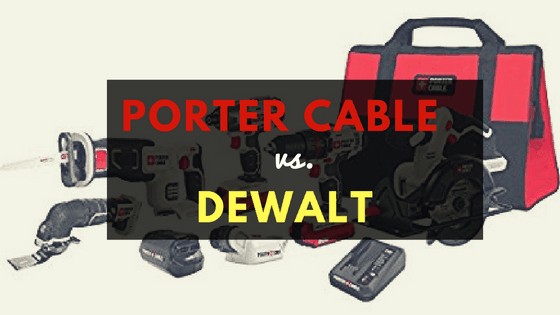Unless you’re in the business full-time, it’s tough to keep up with power tool companies: Brand names are always selling out, changing names/ownership, relocating manufacturing, and so on and so forth.
Porter-Cable and DeWalt, although they’ve taken somewhat different ‘commercial’ paths over the last few decades, are both big, reputable names in the industry that manufacture quality power tools. However, there’s definitely a distinction to be made between the two, as is evidenced by the substantial price gap between the brands.
[sc name="Porter Cable vs DeWalt"]
DeWalt continues to be one of the industry leaders for both professionals and DIY’ers alike; they manufacture some of the best-of-the-best tools out there, and are a trusted name from construction sites to home garages.
On the other hand, Porter-Cable is definitely a more budget option - you’d be hard-pressed to walk onto a professional job site and find the crew using Porter-Cable tools. Now, that isn’t to say by any means that Porter-Cable is junk.
For standard, light use around the home, PC tools are a great budget option.
So which brand is best for you and your needs? Check out our full brand to brand comparison below, and decide for yourself.
Brief histories: Porter-Cable and DeWalt
Both Porter-Cable and DeWalt are American-born companies that sprung to life in the early 1900’s (Porter-Cable in 1906 and DeWalt in 1924). Both were originally east coast companies; DeWalt started out in Lancaster, Pennsylvania, while Porter-Cable began its life in F.E. Cable and the Porter Brothers’ (R.E. and G.G.) machine shop in Syracuse, New York.
DeWalt rose to fame and fortune largely through their production of the industry-changing radial arm saw, which was invented by Ray DeWalt, the company’s founder.
Porter-Cable achieved a similar reputation through the 1920’s with their line of electric belt sanders, and later, with the introduction of the handheld circular saw.
The Porter-Cable name can’t be discussed without mentioning the legendary Art Emmons, who oversaw the engineering/design division of the company for nearly four decades from the mid-1920’s until his retirement in the early 60’s - pretty much single-handedly building the company into the dynasty that it is today. (Also is credited with inventing the electric circular saw).
When Emmons retired in the 60’s, Porter-Cable was sold to the Rockwell Corporation, who wiped out the Porter-Cable name and drastically cut back on production costs and quality in order to compete with Black and Decker’s line of super-budget home power tools. The company then experienced a bit of a revival in the mid-80’s when Delta Machinery acquired Rockwell’s power tool division and brought the Porter-Cable name back to life - increasing production quality along the way.
Coincidentally, nowadays both DeWalt and Porter-Cable are owned by the massive American-based conglomerate Stanley Black and Decker. The DeWalt division continues to produce higher quality, industry-leading tools, while Porter-Cable is much more the budget division - the purpose of their line is to compete with other budget options like Ryobi, Harbor Freight, etc.
Warranty and Manufacturing Facilities
The majority of manufacturing for both DeWalt and Porter-Cable is outsourced, with assembly largely taking place in China and Mexico. However, it must be mentioned that several years ago DeWalt made a pretty huge step to bring a lot of their assembly back home to the U.S., opening up seven brand new manufacturing facilities and creating thousands of new American jobs.
As far as warranty, Dewalt offers a pretty standard 3-year warranty on all of their handheld power tools - anything that fails or breaks due to manufacturing default within three years will be replaced or repaired. Porter-Cable offers a similar 3-year warranty on their line of cordless tools, but that’s only for the tool itself - batteries are backed up by a 2-year warranty.
Head to head comparison: Should I buy Porter-Cable or DeWalt?
Alright, down to the nitty-gritty. We are here to talk abou tools, after all.
Like we mentioned in the introduction, when it comes to the DeWalt and Porter-Cable names, it’d be wise to consider the old adage you get what you pay for.
DeWalt is best-of-the-best; if you’re getting into it for the long haul and plan on getting some serious use and abuse out of your tools (i.e. construction, remodeling), we highly recommend making the investment and going with the best quality.
On the other hand, if you’re just wanting to have some tools around the house to dabble here and there, or just to have one handy if/when you might need it, most of Porter-Cable’s cordless tools will suit just fine for around the home jobs (repairing furniture, light woodworking, etc).
For reference, we’ll take a look at a couple of DeWalt’s and Porter-Cable’s cordless tool combo kits, to really get an idea of what exactly each brand offers, and where the major differences in price/quality lie.
Porter-Cable 20V Max LiNKED 6-Tool Combo Kit w/ USB Device
Last update on 2024-07-30 / Affiliate links / Images from Amazon Product Advertising API
DeWalt’s line of cordless tools also use batteries labeled as 20V MAX. Coincidence? Hardly. Don’t let the names fool you - DeWalt Li-Ion MAX batteries are certainly better than the Porter-Cable 20V ‘version’. (For the same reason that AA Energizer batteries are about three times as expensive as AA Rayovac batteries).
This 6-tool kit comes with a ½” drill, ¼” impact driver (check out our article here on hammer drills vs. impact drivers), 6 ½” circular saw, reciprocating saw, variable speed oscillating tool for compact sanding/grinding/cutting, and an LED flashlight.
The package also comes with a pretty cool dual USB portable charger - you plug it into the 20V battery charger, and you’ve got a remote USB charger that you can take anywhere. Pretty sweet little extra piece.
Also, Porter-Cable offers a 4-tool combo kit that includes just the drill, circular saw, reciprocating saw, and LED light.
Oh, and both kits come with a heavy-duty Porter-Cable contractor bag.
DeWalt 20V MAX Li-Ion 5-tool Cordless Combo Kit
Last update on 2024-10-31 / Affiliate links / Images from Amazon Product Advertising API
The DeWalt kit comes with the same gear as the Porter-Cable package: a ½” drill/driver (this one’s a hammer drill, unlike the PC. Not sure what a hammer drill is? Check out our article here)
It also includes a ¼” impact driver, a 6 ½” circular saw, a reciprocating saw, and an LED light.
Alright so what’s the deal, seriously? We’ve got two kits here with the same exact tools, and one’s nearly double the price.
Why?
If you were to pick up, for example, the ½” DeWalt drill, set it down, and then pick up the ½” Porter-Cable drill, you’d notice a big difference right off the bat in weight. DeWalt tools are constructed with much better quality materials, from the inside out.
Their motors and transmissions have all-metal bearings, whereas the Porter-Cable tools, even though they may have similar torque/rpm specs, are constructed of inferior materials - nylons and high-grade plastics are used in place of the more expensive metals.
What does that mean? It comes down to durability, mostly.
DeWalt tools will be able to handle much, much more wear and tear than a Porter-Cable. Like we said - for job sites, or if you’re really planning on putting your machines through the wringer, make the investment in DeWalt.
You’ll find another big difference in battery life/power. Even though both are 20V batteries, the juice in a DeWalt MAX will last much longer than the Porter-Cable 20V. Lifespan is another difference - Porter-Cable batteries will die out and be unable to take/hold a quality charge much sooner than the DeWalt (hence the difference in warranty).
The Bottom Line
It’s likely that you came here with some sort of question like, "are Porter-Cable tools good", or "what’s the difference between DeWalt and Porter-Cable."
Hopefully, now you can distinguish a little better between the two, and see where that gap in price comes from. Like we said, for durability, professional quality, and years of performance, you can’t go wrong with DeWalt. On the other hand, for light around-the-house use, there’s certainly nothing at all wrong in going with Porter-Cable.
What’s our recommendation?
Well, we’re admitted DeWalt fans. But shoot, looking at those price tags, it definitely makes us second guess some things. All in all, we certainly wouldn’t hesitate to recommend giving the Porter-Cable lineup a shot.




